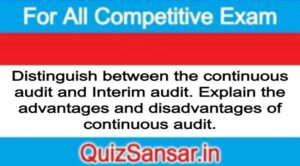
Distinguish between the continuous audit and Interim audit. Explain the advantages and disadvantages of continuous audit.
Distinguish between the continuous audit and Interim audit. Explain the advantages and disadvantages of continuous audit.
Ans.
DISTINCTION BETWEEN THE CONTINUOUS AUDIT AND INTERIM AUDIT
(1) In the case of Continuous Audit, the work of audit is carried on up to any date, accounting to the convenience of the auditor and his client while in the case of Interim Audit the work of audit is up to a definite date according to the instructions of the client.
(2) In the case of Continuous Audit, the verification of assets and liabilities is done after the balance sheet has been prepared at the end of the accounting period while in the case of Interim Audit the assets and liabilities are verified when such an audit is conducted.
(3) In the case of Continuous Audit, no trial balance is prepared though the totals of certain accounts may be noted while in the case of Interim Audit the trial balance has to be prepared or checked.
(4) In the case of Continuous Audit, the object is not to know the profit or loss while the Interim Audit is conducted with the object of finding the profit or the loss.
The question often asked is, what type of audit is satisfactory which may be adopted, as both the continuous and periodical audits have advantages as well as drawbacks.
It is suggested that a continuous audit followed by the final audit conducted by another independent auditor is the most satisfactory type of audit although it is very expensive. The type of audit to be adopted depends upon the magnitude of the business.
Occasional Audit: As the name indicates, this type of audit is conducted once in a while whenever the need arises and the client desires it to be carried out. This is possible only in case of proprietor concerns such as a sole-trader’s business or a partnership business.
ADVANTAGES OF CONTINUOUS ADUIT
(1) Easy and quick Discovery of Errors- Errors and frauds can be discovered easily and quickly as the auditor checks the accounts at regular intervals and in detail. If he were to check the accounts after one year, it would be difficult to locate and error. As the auditor visits his clients, say, after a month or two or so, the number of transactions will be small and hence the errors will be detected easily and quickly.
(2) Knowledge of Technical Details- Since the auditor remains more in touch with the business, he is in a position to know the technical details of it and hence can be of great help to his clients by making valuable suggestions.
(3) Quick Presentation of Accounts- Most of the checking work having been already preformed during the course of the year, the final audited accounts can be presented to the shareholders soon after the close of the financial year at the annual general meeting.
(4) Keeps the Client’s Staff Regular- As the auditor visits the clients, at regular intervals, the clerks will be very regular in keeping the accounts up-to-date. They will see that there is no inaccuracy or frauds as it would be detected by the auditor at his next visit.
(5) Moral Check on the Client’s Staff- If the auditor pays surprise visits, it will have a considerable moral check on the clerks preparing the accounts as they do not know when the auditor may pay a visit to check the accounts. The moral check will be more than in the case of Interim Audit described in the following pages.
(6) Efficient Audit- The auditor, having more time at his disposal, can check the accounts with greater attention and in detail and his work will be more efficient.
(7) Preparation of Interim Accounts- Where the director of a company wish to declare an interim dividend, continuous audit will help in the preparation of the interim accounts without much delay.
(8) Audit Staff can be kept busy- The audit staff may be sent to other clients after having finished the work for one client. Thus whole of the staff can be kept busy throughout the year.
DISADVANTAGES OF CONTINUOUS AUDIT
A continuous audit suffers from following weaknesses:
(1) Change in Figures- Since the auditing records simultaneously check with the preparation of accounts, there is scope of are manipulations after the auditor has checked specific part of books of accounts.
(2) More Expensive- This is the class of auditing is quite expensive and therefore small and less profitable concerns cannot afford to adopt it.
(3) Hindrance in the Work of Business- Sometimes the frequent visit of the auditors makes it convenient for staff to record the accounts efficiently.
(4) Mechanical Audit Work- The audit work becomes mechanical and there by it losses its force. Then the object may not be achieved.
(5) Break of Work Chain- Since the audit work is not carried out at a stretch, there is loss of continuity in the auditor’s work. For this reason there may be :
(a) Outstanding queries may not be cleared up.
(b) Some in-completed transactions may not be allowed.
(c) Some confusions in the minds of auditor.
- What is meant by Database Management System?
- Discuss the advantages and drawbacks of database.
- What do you mean by database ? Discuss its Characteristics.
- What is Data Mining?
- What are the conditions of communication?
- What do you mean by business communication ?
- organization / Differentiate between classical and modern theory of organization
- What is forecasting






